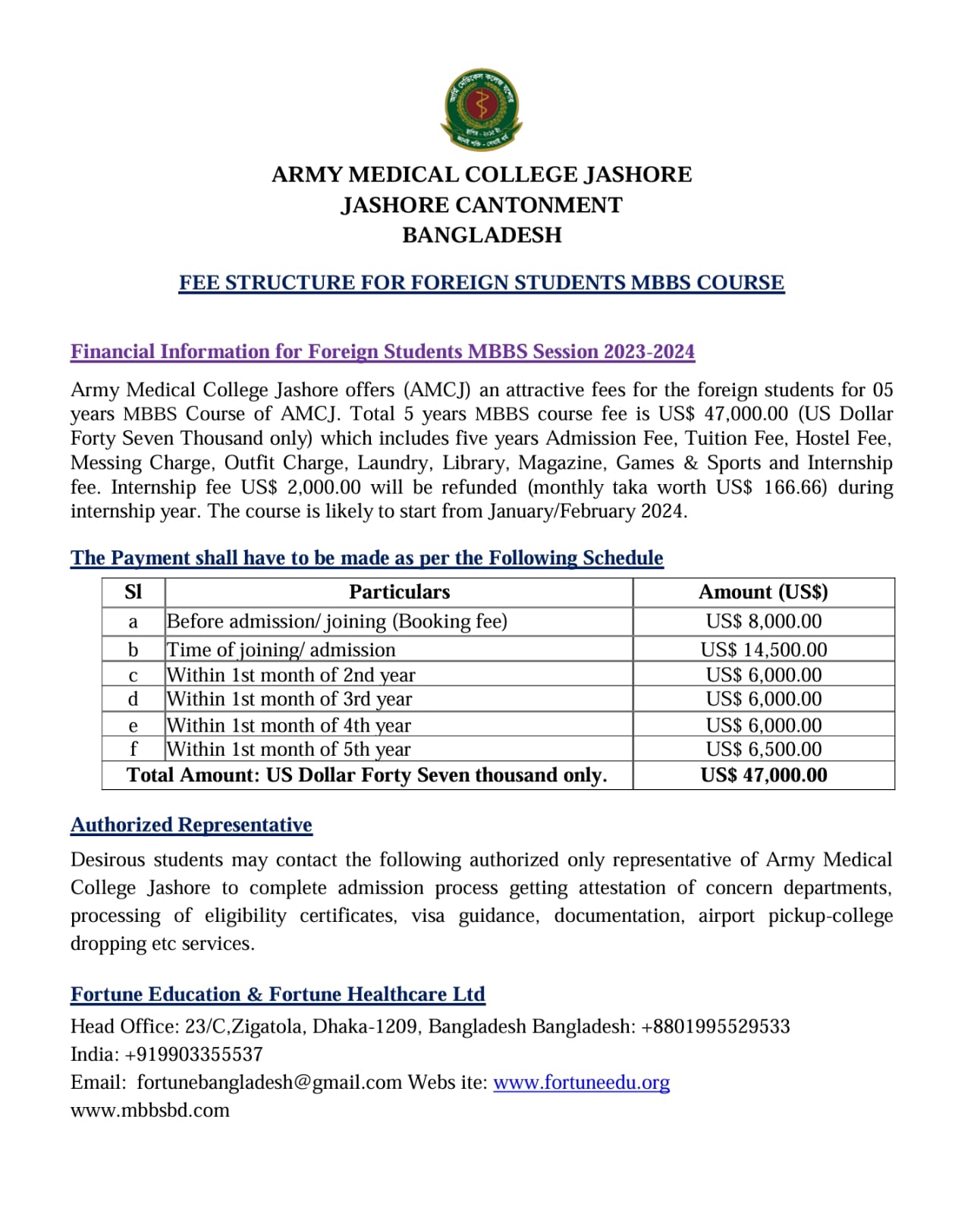Studying MBBS (Bachelor of Medicine, Bachelor of Surgery) in Bangladesh can be an appealing option for international students, especially those from neighboring countries like India, Nepal, and other Asian nations. Here are some key aspects to consider:
MBBS in Bangladesh for International Students
- Quality of Education: Many medical colleges in Bangladesh offer a good standard of education, comparable to other countries in South Asia. The curriculum often closely follows that of the Indian medical education system, which is beneficial for students from India.
- Cost: Studying MBBS in Bangladesh can be more cost-effective than in many Western countries. The tuition fees and living expenses are generally lower, making it a financially viable option for many students.
- Eligibility and Admission Process: International students typically need to meet certain academic criteria and might have to pass entrance exams or screenings. The specific requirements can vary from college to college.
- Recognition and Accreditation: It’s important to check if the degree from the medical college in Bangladesh is recognized by medical councils or boards in the student’s home country. This is crucial for those who wish to practice medicine or pursue further studies in their home country or elsewhere.
- Language: The medium of instruction is usually English, which is beneficial for international students. However, learning the local language, Bengali, can be important for interacting with patients during clinical training.
- Cultural Adaptation: Living in Bangladesh will require adapting to a new culture and lifestyle, which can be a rewarding experience but also a challenge for some students.
- Clinical Exposure: Medical colleges in Bangladesh often have good hospital affiliations, providing students with practical exposure and clinical training opportunities.
- Safety and Living Conditions: Researching the living conditions, safety, and local laws in Bangladesh is important for a smooth educational experience.
- Visa and Documentation: International students need to obtain a student visa and complete other necessary documentation for studying and residing in Bangladesh.
- Post-Graduation Opportunities: Explore the opportunities for further specialization or employment in the home country or elsewhere after completing the MBBS from Bangladesh.
Prospective students should thoroughly research and reach out to the respective medical colleges in Bangladesh for detailed and up-to-date information. Additionally, consulting with current students or alumni of these colleges can provide valuable insights.
Studying MBBS (Bachelor of Medicine, Bachelor of Surgery) in Bangladesh has become an increasingly popular option for students from various countries, including India, Nepal, and other parts of Asia. Here are some key aspects to consider if you’re interested in pursuing an MBBS in Bangladesh:
- Quality of Education: Medical colleges in Bangladesh are known for their high standard of medical education. The curriculum is comprehensive, focusing on both theoretical knowledge and practical skills.
- Affordability: Compared to medical education in countries like the USA, UK, or even India, Bangladesh offers a more affordable option. This includes lower tuition fees and living costs.
- Recognition of Degrees: MBBS degrees from Bangladesh are recognized by many international bodies, including the World Health Organization (WHO), and medical councils in countries like India (MCI), Nepal, and others. Graduates can practice medicine in their home countries after fulfilling respective licensure requirements.
- Medium of Instruction: The medium of instruction in most medical colleges is English, making it accessible for international students. However, learning the local language, Bengali, can be beneficial for interacting with patients during clinical rotations.
- Admission Requirements: Admission criteria for MBBS in Bangladesh usually include a high school diploma with good grades, especially in science subjects. Some colleges may require entrance exams or interviews.
- Clinical Exposure: Medical education in Bangladesh emphasizes hands-on clinical training. Students get practical experience in affiliated hospitals, which is crucial for developing clinical skills.
- Cultural Exposure: Studying in Bangladesh provides an opportunity to experience a new culture and lifestyle, which can be enriching for international students.
- Eligibility for International Students: Specific eligibility criteria for international students, such as NEET (National Eligibility cum Entrance Test) scores for Indian students, need to be met.
- Safety and Accommodation: Researching the safety, accommodation options, and living conditions in the city where the college is located is important for a comfortable stay.
Post-Graduation Opportunities: After completing MBBS in Bangladesh, students have various options, including practicing medicine in their home country (after clearing necessary exams), pursuing higher studies, or working in healthcare sectors in different countries.
The fee structure for Army Medical Colleges in Bangladesh can vary depending on several factors, including the specific college, the program, and whether the student is a local or international candidate. Here are some general points regarding the fees structure in Army Medical Colleges:
- Tuition Fees: This is usually the most significant part of the cost. Tuition fees can vary from one Army Medical College to another. For international students, the fees might be higher compared to local students.
- Admission Fees: Some colleges charge a one-time admission fee at the beginning of the course.
- Miscellaneous Fees: This can include charges for things like library use, laboratory fees, and other educational resources.
- Hostel and Accommodation Fees: If you require on-campus accommodation, there will be additional charges for hostel facilities. These fees will vary based on the type of accommodation provided.
- Food and Living Expenses: While not directly part of the college fees, you should also consider the cost of living, including food, transportation, and personal expenses.
- Medical Insurance: Some colleges might require students to have medical insurance, which could be an additional cost.
- Examination Fees: There could be fees associated with examinations taken during the course.

Army Medical Colleges and the role of Fortune Education
Studying MBBS in Bangladesh, specifically related to Army Medical Colleges and the role of Fortune Education as a consultant. Here’s a breakdown of the topics you mentioned:
Army Medical College Bangladesh Study Environment: Army Medical Colleges in Bangladesh are known for their disciplined and structured environment. These institutions typically offer high standards of medical education with a focus on rigorous academic and practical training. The study environment in these colleges is usually conducive to learning, with facilities that support both theoretical and clinical aspects of medical education.
Fortune Education Offers Direct MBBS Admission: Fortune Education is an educational consultant that assists students in securing admission to medical colleges, including those in Bangladesh. They may offer services like direct MBBS admission, which simplifies the process for students, especially international students.
However, it’s important to verify the credibility and recognition of such consultants and understand the admission process they follow.
Elite MBBS Programs in Bangladesh: Bangladesh offers several reputed MBBS programs, known for their quality education and practical training. These programs are often recognized by major medical councils globally, making them attractive to students from various countries.
MBBS in Bangladesh for Indian Students: For Indian students, MBBS in Bangladesh is a popular choice due to its affordability, quality of education, and proximity to India. The curriculum closely aligns with that of India, and degrees are usually recognized by the Medical Council of India (MCI), provided students clear the Foreign Medical Graduate Examination (FMGE) upon their return.
Bangladesh Army Medical College Admission Requirements: Admission requirements for Army Medical Colleges in Bangladesh generally include a high school diploma with strong science grades, proficiency in English, and sometimes, specific entrance examinations or interviews. These requirements can vary, so it’s advisable to check directly with the college for the most accurate information.
Fortune Education is Recognized Consultant of Medical Education: If Fortune Education is recognized as a consultant for medical education, they should provide reliable information and assistance in the admission process for medical colleges in Bangladesh. Always verify the recognition and track record of educational consultants.
Army Medical Colleges Bangladesh
Army Medical College Bogra, Bangladesh
Army Medical College Cumilla, Bangladesh
Army Medical College Jashore, Bangladesh
Rangpur Army Medical College, Bangladesh
- Renowned Army Medical Colleges in Bangladesh: Army Medical Colleges in Bangladesh are known for their excellence in medical education. These colleges often have state-of-the-art facilities and provide a strong foundation in both theoretical and practical medical training.
- MBBS Bangladesh Clinical Exposure: Clinical exposure in MBBS programs in Bangladesh is significant, with students getting hands-on experience in hospitals. This aspect of the program is critical for developing practical skills in patient care and medical procedures.
- Army Medical College Bangladesh Campus Tour: Visiting the campus can be an excellent way for prospective students to get a feel for the environment and facilities. Some colleges may offer virtual tours, especially beneficial for international students.
- Fortune Education Provides Online Admission with Seat Confirmation: If Fortune Education offers online admission services with seat confirmation, this could be a convenient option for students. However, ensure that this process is transparent and that you understand all the terms and conditions involved.
For accurate and specific information, it’s best to contact the Army Medical Colleges directly or visit their official websites. Additionally, thoroughly research and verify the credentials of any educational consultant like Fortune Education before engaging their
In Bangladesh, MBBS programs are designed to provide substantial clinical exposure to students. This is an integral part of the curriculum.
Students typically start with theoretical classes and lab work, progressively moving to hands-on clinical training in the later years of the program.
Most medical colleges in Bangladesh are affiliated with one or more hospitals. These affiliations allow students to gain practical experience in a real-world medical setting.
Clinical rotations cover various departments, offering students a well-rounded experience in different aspects of medicine.
The exposure to diverse medical cases and patient interactions in Bangladesh can be particularly beneficial due to the country’s varied demographic and health conditions.
Army Medical Colleges in Bangladesh are known for their disciplined environment and well-structured programs.
These colleges usually have campuses equipped with modern facilities, including state-of-the-art laboratories, libraries, and clinical training equipment.
Some colleges might offer campus tours for prospective students, which can be a great way to experience the college atmosphere, infrastructure, and talk to current students and faculty.
If an in-person visit is not feasible, prospective students can check if virtual tours or online information sessions are available.
Visiting the campus, either virtually or in person, can help in making an informed decision about attending the college.
Fortune Education is an educational consultancy that assists students in securing admissions in medical colleges, including those in Bangladesh.
They claim to offer services like online admission assistance with seat confirmation. This can be a convenient option for international students, simplifying the admission process.
However, it’s essential to exercise due diligence when using the services of any consultancy. Check for authenticity, recognition, and reviews from past students.
Understand the terms and conditions of their services, including fees, refund policies, and the extent of support they provide throughout the admission process.
Additionally, it is advisable to directly contact the medical colleges or visit their official websites for confirmation and additional information.

Fortune Education
Fortune Education facilitates the online admission process for aspiring students who wish to pursue MBBS in Bangladesh
For all these aspects, thorough research and due diligence are crucial. It’s recommended to directly contact the Army Medical Colleges for accurate information on campus tours and admissions. Also, verify the credentials and services of consultancies like Fortune Education independently.
Why MBBS in Bangladesh Best for International Students
MBBS (Bachelor of Medicine, Bachelor of Surgery) in Bangladesh has become an increasingly attractive option for international students due to several compelling reasons:
- Quality of Education: Medical colleges in Bangladesh offer high-quality medical education. The curriculum is comprehensive, adhering to international standards, which ensures students receive a solid foundation in both theoretical and practical aspects of medicine.
- Affordable Tuition and Living Costs: Compared to many Western countries, and even some Asian nations, the cost of studying MBBS in Bangladesh is quite reasonable. Both tuition fees and the cost of living are lower, making it an economically viable option for many students.
- Recognized Degrees: MBBS degrees from Bangladesh are recognized by various international medical councils and organizations, including the World Health Organization (WHO). Graduates are eligible to sit for medical licensing examinations in numerous countries including the US (USMLE), UK (PLAB), and Australia (AMC).
- Medium of Instruction: The medium of instruction in most medical colleges in Bangladesh is English, which is beneficial for international students. This eliminates the language barrier often faced in non-English speaking countries.
- Cultural Diversity: Bangladesh hosts students from various countries, fostering a multicultural environment. This diversity enriches the student experience, both academically and socially.
- Clinical Exposure: Medical programs in Bangladesh place a strong emphasis on practical clinical training. Students gain hands-on experience in affiliated hospitals, dealing with a wide range of medical cases, which is crucial for a budding medical professional.
- Similar Disease Spectrum: For students from neighboring countries, especially in South Asia, the disease spectrum in Bangladesh is quite similar to their home countries. This relevance makes the clinical training and medical experience more applicable and useful in their future practice.
- Ease of Adaptation: The cultural and social environment in Bangladesh is similar to that of several neighboring countries. This similarity can make adaptation easier for international students, especially those from South Asia.
- SAARC Quota: For students from SAARC (South Asian Association for Regional Cooperation) countries, there is a special quota in many medical colleges, sometimes with reduced tuition fees.
- Post-Graduation Opportunities: Graduates of MBBS programs in Bangladesh have a wide array of opportunities post-graduation, including pursuing higher education and specialization in various fields of medicine, both in Bangladesh and abroad.
Challenges of MBBS in Bangladesh
Pursuing an MBBS in Bangladesh, like any international education endeavor, comes with its own set of challenges. Being aware of these can help prospective students prepare better. Some of the common challenges include:
Language Barrier: While the medium of instruction is English, the local language is Bengali. International students may face difficulties in communicating with local patients during clinical rotations, or in everyday interactions outside the college.
Cultural Differences: Adapting to a new culture is always a challenge. Students might find it difficult to adjust to the local food, lifestyle, and social norms, which can be significantly different from their home country.



